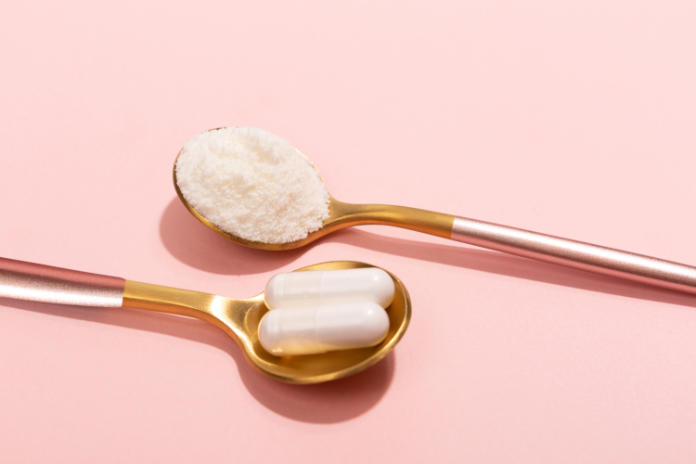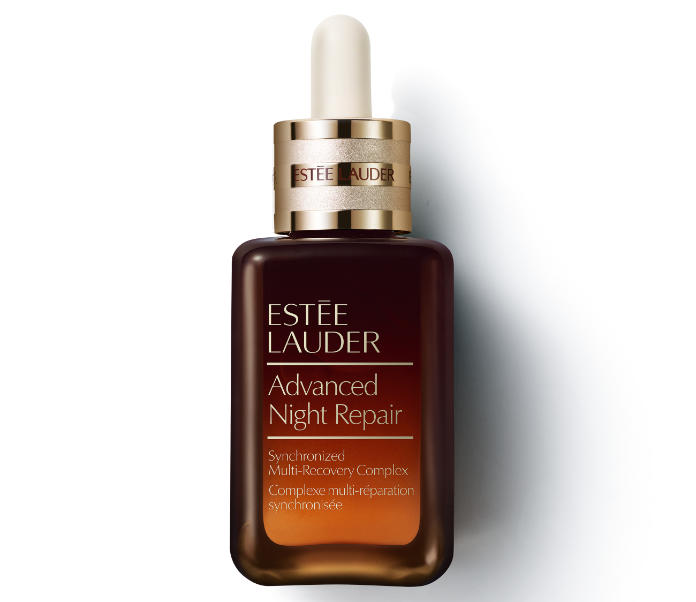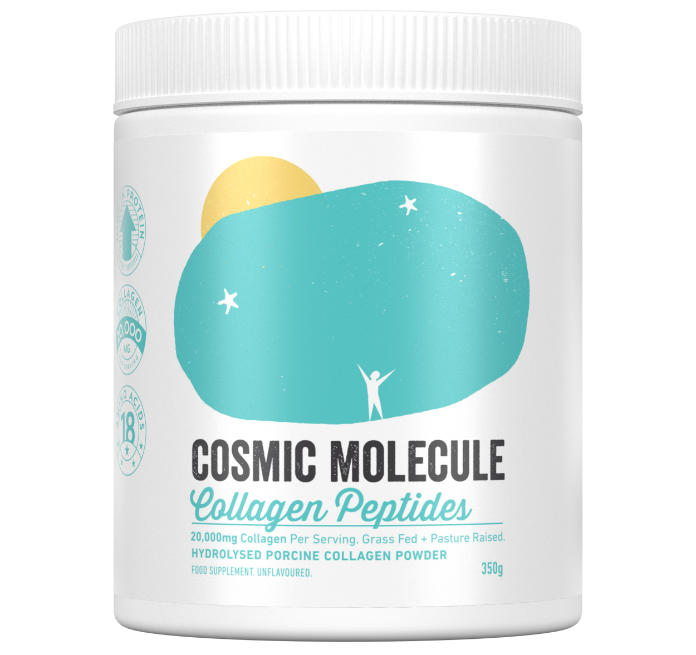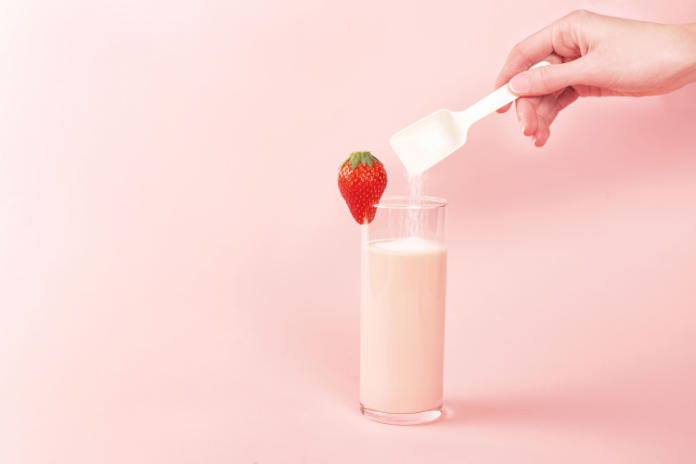You may have heard of collagen as a beauty buzzword and know it’s important in terms of anti-ageing, but how much do you really know about this crucial skin component and is collagen good for skin?
We asked skin experts to answer our collagen FAQs, and here’s what they had to say…
What is collagen and why is it so important in terms of skin ageing?

“Collagen is our most abundant protein,” says Dr Thurein Ne Win, senior dermatologist and clinical researcher at Plymouth University Hospital NHS Trust and resident dermatologist at Absolute Collagen. “It’s commonly found in the skin, bones and connective tissue within the body, providing structural support, strength and a degree of flexibility where needed.
“Collagen is naturally produced in the body, however it gradually starts to deplete from the age of 25, which can lead to sagging of the skin and formation of wrinkles and fine lines.”
What can be done to prevent the decline of collagen production?
“Our skin ages as a result of normal changes in the body as we age, combined with the damaging effect of external factors such as sun exposure, pollution, stress and diet,” says Anthony Gonzalez, head of R&D at Avon, but we can help slow down skin ageing by making certain lifestyle choices.
“Diet is a great place to start, as it plays a surprisingly large role in the appearance and youthfulness of your skin,” says Nu Tan, founder of Cosmic Molecule. “You get the specific component for collagen by eating a balanced diet of protein-rich foods, for example: broth, chicken, beef, eggs, legumes, nuts and whole grains.”
Skincare can also help, Tan says, but you don’t have to shell out on expensive products. “In terms of skincare, the best preventative measure is not your £100 anti-ageing moisturiser, it’s your good old trusty sunscreen with a minimum SPF30.
“Another great product for your skin is a Vitamin C serum, as it is a great antioxidant that helps repair and prevents further sun damage when you’re out and about during the day.”
Other key ingredients can help, Gonzalez says, “such as glycolic acid, retinol”.
Is it better to start using anti-ageing products at a younger age?

“Although there is no magic remedy to revert your skin back to its teenage years, it is possible to help replenish collagen supplies to improve its structure, which will have visible benefits,” says Ne Win, who recommends that if you want to take a collagen supplement the best time to start is from around the age of 25. “Taking a daily dose of collagen from this point is where a user will see optimum skin rejuvenation and tissue renewal.”
“Prevention is always better than cure,” says Tan. “It’s worth cultivating a good skincare regime at a younger age so it becomes routine.”
What’s the difference between taking collagen supplements and using skincare products?
While our experts all agree that SPF is hugely important in terms of protecting skin, they diverge when it comes to skincare versus supplements.

“Although creams and serums containing collagen can sometimes give your skin a slightly more plumped effect, this is usually due to the moisturising characteristics of some of the other ingredients included, rather than the effectiveness of the topical collagen itself,” says Ne Win.
“If your diet is rich in essential fatty acids, antioxidants and proteins, there’s likely no need for collagen supplements,” says Gonzalez. “The reality is that few of us hit all three, so collagen supplements can help here, as well as topical skincare products that help stimulate collagen production.”
Does drinking collagen work?
Anyone who has a passing interest in skincare will be well used to applying creams, serums and oils to their face for glowing skin. But what about adding a drink into your regime?

There’s a growing trend in the wellness and beauty communities for drinking collagen as part of a well-rounded health and skincare routine. You might recognise this ingredient, as it’s used in certain types of fillers, injected into the face to smooth out lines. However, there’s no need to be alarmed – it’s a naturally-occurring protein, drinks are non-invasive, and what if it’s the secret to youthful skin?
Here’s everything you need to know about drinking collagen as part of your skincare routine…
The trend for drinking collagen has skyrocketed. LQ Collagen – a range of shots and powders, for example, recently saw a 793% increase in week-on-week sales for one particular product. The prospect of drinking part of your skincare routine might seem alien to those familiar with applying products to your face, so why is this such a popular way to do it?
Drinks like this can “stimulate and increase your body’s own production of collagen”, explains Dr Preema Vig, medical director of the Dr Preema Clinic, compared to topical products which “tend to ‘treat’ the upper dermis and stimulate the activity on the upper layers of the skin”.
Vig suggests the popularity of drinking collagen is due to “the convenience of being able to take them immediately, without having to have a drink to hand to take capsules”, she says. “In addition – some people find it easier than taking multiple capsules, and generally it’s absorbed easily and more quickly.” You can buy collagen drinks either pre-mixed or as powders.
One of the most frustrating things about skincare is how much time it takes to see any changes from a new product you’re trying. While Vig admits the impact of drinking collagen varies depending on the product you use, she says: “I normally advise patients to allow three to six months to see the benefits, although some of them have fed back that they feel and see the changes as early as four to six weeks into taking a product.”
How quickly you see a change in your skin also depends on “the severity of your deficiency” of collagen, says Vig.
Of course, drinking collagen should be used on top of a sensible skincare regime, wearing sunscreen every day and drinking plenty of water. The occasional collagen-packed drink won’t stand much of a chance if you rarely moisturise and have dehydrated skin.
Drinking collagen is relatively low risk, but you still need to be sensible.
“As with all supplements, the key is to follow the product usage guidelines and not combine too many products,” says Vig. “There is no substitution for a healthy diet, adequate water intake and exercise to provide the body with the perfect balance to function optimally.”
It’s also worth noting that most collagen drinks aren’t vegan, but you can get plant-based versions.































































